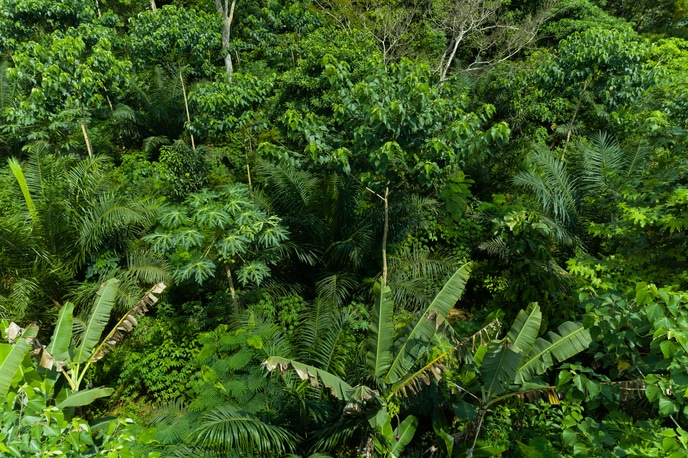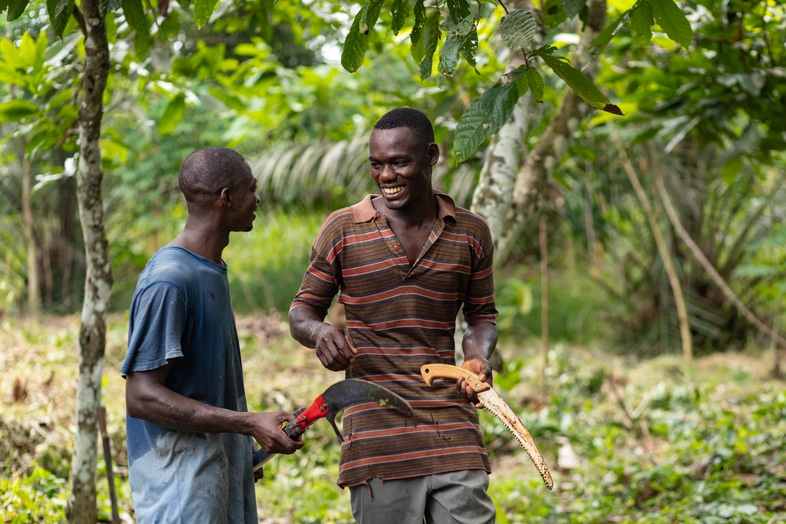Yes—Dr. Bronner’s is making chocolate!
I can guess what some of you are thinking.
“I’m all for it. But why?!”
The short version: Our mission, first and foremost, is to use our company as a vehicle for social good—and creating a line of organic, fair trade and vegan Magic All-One Chocolate presented an opportunity to invest even more resources into transparent, ethical supply chains, and regenerative organic farming practices that help mitigate climate change.
The long version: Back in 2009, we helped establish the world’s first certified organic & fair trade palm oil project in Ghana: Serendipalm. Palm oil has a bad reputation, in part because of the ecological destruction it’s caused in countries like Indonesia—but oil palms have been grown in Ghana for centuries, no new deforestation occurs as a result of the growing or harvesting process at Serendipalm, and orangutans don’t live in this part of the world.
Since 2009, we’ve helped provide an estimated 800 farmers with the resources needed to convert conventional palm and cocoa fields to regenerative organic agriculture. This means that farmers were able to move away from toxic pesticides, soil degradation and a heavy carbon footprint toward a way of farming that mimics nature, prioritizes soil health, and helps combat climate change.

How are we doing this? By helping farmers establish “dynamic agroforestry” practices—in which complementary crops are planted next to each other (in this case, oil palms, cocoa trees, papaya, cassava, and more) in dense stands. Dynamic agroforestry replicates the way plants naturally support each other in a healthy tropical forest. It also creates biodiversity, improves yields and income streams, and eliminates the need for toxic pesticides and fertilizers.
Now, we can’t talk about why Dr. Bronner’s started making chocolate without also talking about fair trade, and the egregious abuses in the chocolate industry—things like widespread ecological destruction, climate instability, poverty, worker exploitation, child labor, and even slavery. Doesn’t this sound like a world we desperately need to move away from?
The true cost of chocolate (like many things we buy) has been externalized in the name of profit for a few, at the expense of many. In this case, it’s cocoa-producing communities who suffer the most—such as adult cocoa farmers who earn less than $1 per day.
“At the root of this exploitation is an extractive business model that relies on poverty prices for farmers. This extractive model is hidden behind an appalling lack of transparency made possible by complicated supply chains with many barriers between farmers and chocolate brands.
Only 44 percent of Nestlé’s cocoa can be traced back to the cooperatives that produced it; and 51 percent of Mars brand’s cocoa is traceable back to farmer cooperatives in its own supply chain,” says Mike Bronner, president of Dr. Bronner’s, in a FoodTank op-ed.
We choose to work directly with farmers to address this from the ground up: by supporting them in converting poor farming practices to regenerative organic methods that produce higher yields and higher income; by guaranteeing fair prices for the cocoa we use in our Magic All-One Chocolate (on average 15% higher than the conventional price); and by paying a stable fair trade floor price, which ensures production costs are always covered and farmers always earn an income, regardless of low market prices.

In order to fulfill chocolate’s promise as an expression of love and the pure indulgence it’s meant to be, we must choose to direct our individual and collective resources to fair, transparent and ethical supply chains that honor both people and planet.
Ready to taste Dr. Bronner’s Magic All-One Chocolate for yourself? Click here to find it at a store near you!